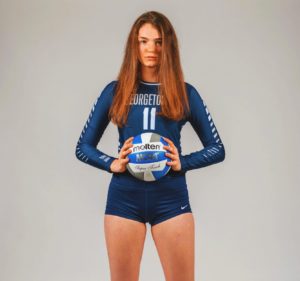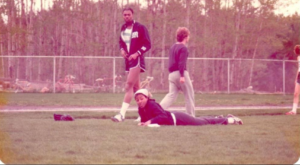Oshrat Eni is a professional Israeli soccer player, youth coach, and sports commentator. She is a former captain for the Israeli Women’s Soccer National Team and is a fierce advocate for the advancement of women’s sports in Israel.
When and why did you start playing soccer? What was it like to be a young female soccer player in Israel?
There is a story that when I was nine months old, an orange dropped in my kitchen, and instead of picking it up, I kicked it around the house. When I was five years old, my dad took me to see a professional soccer game and that was the first time I saw a big match with a crowd. I realized I wanted to be playing on that field. I wanted to be a soccer player.
In first grade, my teacher did a dream exercise with us. We were meant to draw what we wanted to be when we grew up. I drew a soccer ball and said to the class that my dream was to be an Israeli National Team soccer player. At that time, a women’s team did not even exist. The teacher came over to me and asked me to do a different drawing and switch to a different dream. I told her, “this is my dream and I won’t change it.”
And I never did give up that dream. When I played on the National Handball Team, the coach would tell me to stop juggling with my feet. I was a soccer fanatic. I watched all the games on television and was determined to find a team to play on. I was the only girl in my neighborhood that played soccer. When I was sixteen, I heard there was a girl’s team in the next town over so I joined and three weeks later I got a call up for the Under-19 Soccer National Team.
How has being an athlete impacted who you are today?
Being an athlete is everything to me. My parents got divorced when I was ten years old and I came from a low socioeconomic household. Everything was set up for me to fail. When I went to play soccer, people from the neighborhood would shout from the stands “go home, go back to the kitchen, what are you a boy or a girl?” and the minute I did a good move or scored a goal, it was silent. So I knew if I could succeed in sports and prove them wrong, I could be something else. I could succeed in life. I could be something through sports. All the things I have achieved are due to sports.
My mom never traveled out of Israel until she was forty, yet by the time I was twenty-five, sports had taken me to twenty-five different countries. Through sports I learned about different cultures, I learned how to respect others. Everything I am is from sports, from soccer. Sports didn’t play a role in making me who I am, it is who I am.
As a youth girls’ soccer coach, what changes can you see from your experiences with the young athletes you coach?
First of all, they can practice soccer with other girls. That did not exist when I was growing up. They have a lot more choices and resources now. Even if it’s one or two matches aired a year, they can watch women’s soccer on television. They have role models to look up to and want to be like. It’s totally different from when I was young.
What are your hopes for the future of women’s soccer in Israel?
Even though young female athletes have more opportunities now than when I was growing up, it’s still not enough. Women’s sports are still developing here.
There are a lot of complications and mismanagement of women’s soccer in Israel. The overall structure needs to improve. The resources need to increase. TV rights and media coverage needs to broadcast more women’s games. This will all get more girls to play and the level of competition will continue to improve.
I hope that our struggles now to increase opportunities for women in sports will benefit the next generation. The work I do is for the young girls that I’m coaching. My hope is that they will have many more opportunities.
Can you speak about crucial moments in your professional soccer career?
I injured my knee pretty badly and I went to tell the National Team coach that I was finished playing. But when I walked up to the field to have this conversation, I saw my teammates passing and playing and I realized this is what I want to do. This is who I am. And I said I would recover and keep playing until my body finally says no.
Later, when I turned twenty-eight, I got really ill. I was stuck in bed with a lung infection and it made me really stop and think about how my soccer career was going. It was a wake-up call. Even though I had captained the Israeli National Team and won multiple state championships, I did not think I had fulfilled my potential. When I got healthy, I hired a nutritionist and a personal coach and I sent my resume to agents and when I was thirty years old I signed to play in Belgium and watched my hard work pay off.
The Virago Project focuses on the mental health of female athletes. Can you talk about the relationship between your sport and your wellbeing?
After a really successful season, I dislocated my hip from a serious injury. When I was recovering, I had an identity crisis. I didn’t know who I was without soccer. I cried for so many days. I didn’t eat. I didn’t sleep. And my friends said, “it’s okay, you’re thirty-five. You can retire. You achieved so much.” But I did not want my career to end that way. I felt that I had more to give. Also, I was really afraid of who I would be without the game.
I can coach, commentate, and manage – I play a lot of roles in the soccer world. But when people ask me who I am, I always say, “I am a soccer player.” And for that to end, it was a really big crisis for me.
I poured so much into my recovery and this current season is my comeback season.
I am still struggling with how I will handle retiring eventually. I know I will use professional help. I hope it will be a smooth transition but I know it’s not going to be easy. But when I was out with injuries I had time to think about it and now I’m more prepared to deal with anything, including in my personal life. The struggle makes you strong. It’s such a cliche, but it’s true.
What advice would you give to a young female athlete just starting to play?
Just play and love the game. When you love playing and believe in yourself, then you can succeed. You can always look at the bad things and always listen to commentators trash-talking you. But when you know where you want to go, no one can get you off the track. And if the track is not good for you, just make another path. When my teacher told me my dream did not exist, I didn’t stop believing and I made my dream come true. I went to the national team, I received the greatest honor you can get by being awarded captain there. So, just believe in yourself and just love what you do. If you love what you do, you’re going to succeed.
Are there any final comments you want to be sure are included in this interview?
What I have learned in the past year is that we all struggle. I used to think that I was alone in dealing with different obstacles. But then I went to an international leadership program through the American consulate that focused on women’s empowerment through sports media. That’s where I represented Israel and met 46 amazing women from 46 different countries who all work in sports media in different roles. And even though we exist in different cultures and different fields, we go through the same things. We persevere through the same obstacles. Now, I have this group. We support each other, we consult each other, and we comfort each other.
Follow Oshrat Eni and her work on Twitter.
Interview conducted by Ellie Greenberg.



